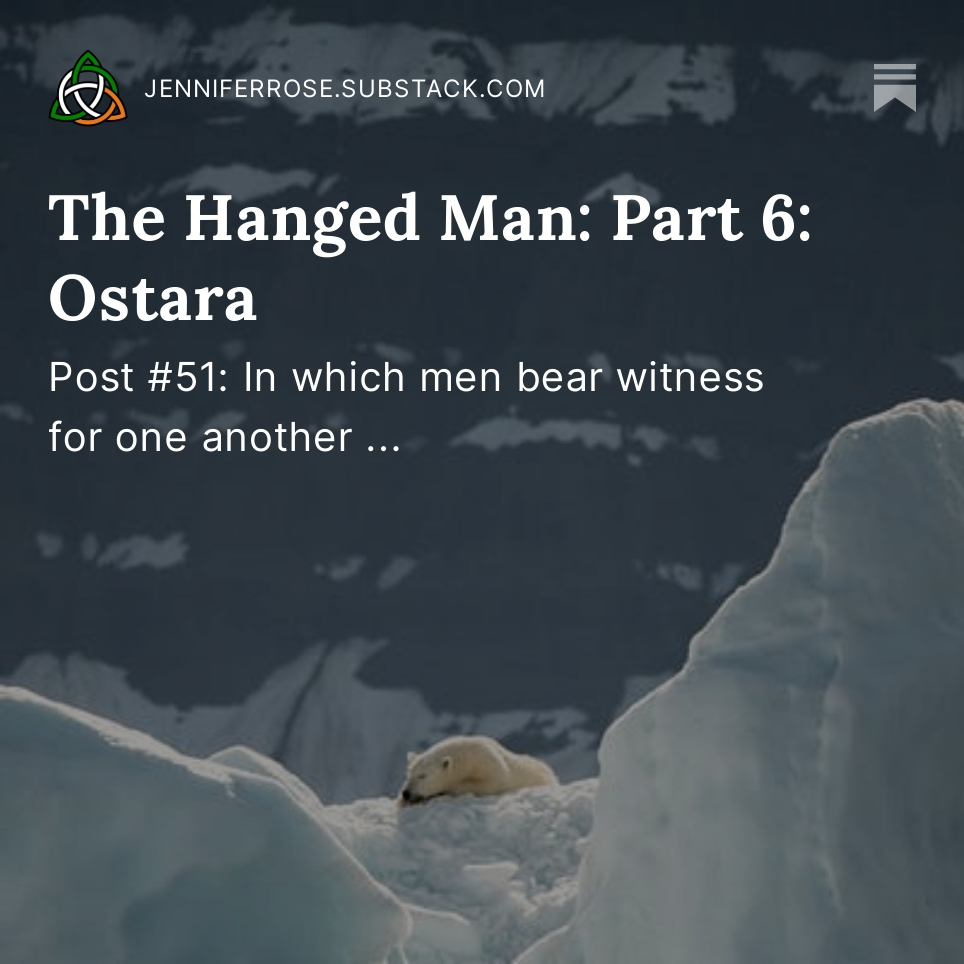by Jenny Rose | Aug 26, 2023 | A Flourishing Woman, The Journey
Two weeks ago my 87-year-old demented mother fell in her memory care unit and broke a hip for the second time in less than a year. Eight days later she died in a hospital under the care of Hospice, my brother at her side.
Until I sat down to write this, I was afraid I had lost my words, lost the need to write them, lost the ability to form them into meaning. But I haven’t. I’m still a writer. This remains. That’s a relief.
Oh, I’ve been writing. Lists. Notes. An obituary. Texts. Updates to family and friends. Daily journaling. But it hasn’t been creative writing. It hasn’t been this blog, or my fiction. These last two weeks have passed by, the first in a blur of pity and anguish, and the second in numb relief glazed with exhaustion, and I have not posted or published. I haven’t kept track of the days; they spill into one another, as the days and nights blended together while my mother lay dying and we waited.
For a time words have simply been inadequate to relieve the pressure of my feelings in any organized or coherent way. They flew away from me, leaving a series of kaleidoscopic impressions, sensual details so vivid they frightened me with their power.
While my mother lay dying I reread my childhood copy of The Wind in the Willows by Kenneth Graham. Reading has also largely failed to sustain me during this time. I find myself unable to focus. I read a paragraph or two, and then realize I’ve been sitting staring into space, out the window or into the garden, not hearing, not seeing, not even thinking. Just sitting. But I needed a companion for the night watches, something comforting and familiar. Something innocent.
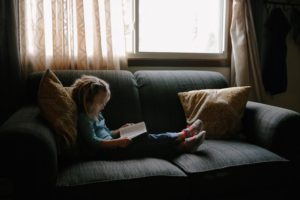
Photo by Josh Applegate on Unsplash
The fan in my window purred during those hours, blowing in cool night air and an occasional moth or mosquito. Every night, when I go to bed, I light a tea light in a candle lantern. When calls or texts reached me, I knew when I opened my eyes if it was before midnight or after, according to whether the candle still burned. Propped up on pillows, glasses on, my small bedside lamp alight, I spoke to Mom’s facility staff, emergency department doctors and nurses. I texted with my family. I read, the well-remembered illustrations making me smile as I communed with Rat, Mole, Badger, and the ridiculous Toad, finding respite for a few minutes before turning off the light and lying awake in the dark room, listening to the fan, feeling my heart beat, resting, breathing, waiting.
While my mother lay dying and after, I’ve stained wooden pallets. My partner and I are building a 3-bin compost system against the back yard fence. We set out sawhorses. I found an old brush, a rag, a stirring stick. We bought stain. I lay a pallet on the sawhorses, brush away dirt and debris, and paint every surface. The raw wood soaks in the oil-based stain, a rich brown color. The brush is more and more frazzled. I’m sloppier than I would be if painting a wall. The pallets are splintery. Some of the boards are split or loose. I bend over, the sun hot on the back of my neck and my bare arms. Mosquitos bite me. Stain drips between the boards as I brush their edges, dappling the sawhorses, falling onto the filthy old cream-colored jeans I’ve been wearing all summer in the garden, and onto my worn-out sneakers, used only for outdoor work now. As I maneuver between the boards, stain smears the skin of my hands and wrists. I kept the phone close, in a patch of shade.
This is the only sustained work I’ve been able to do. Now and then I wash a few dishes. I’ve done a couple loads of laundry. I go out into the garden, note the trimming, pruning, composting, mowing waiting to be done, and turn away. It all feels like too much. I don’t know where to start. It’s impossible to open the garden shed, get the tools, wheel out the wheelbarrow.
But the pallets. I can do that. It’s a simple task, direct. I don’t need to make any choices. Each side takes fifteen or twenty minutes. When I’ve finished a side, I wrap the brush in an old plastic bag, cover the can loosely, let the pallet dry an hour and a half in the sun. Then I turn it over and begin again. Two coats each side. One side after another.

Photo by Manuel Barroso Parejo on Unsplash
The smell of stain. The prickly feeling of intense sun on my skin. I think about compost, recycling, breaking down life to sustain new life. I think of ashes to ashes and dust to dust. I wonder if I’ll ever use the compost bins without thinking of Mom. I wonder who names the colors of stain and paint. I chose ‘Canyon Brown’ for this project. I vaguely hear birds, cars passing by. Small groups of women walk by in clumps, hospital employees on their lunch break, talking about families, gardens, school starting, hospital gossip. I should be at work, on that same campus, just a ten-minute walk away. I should be, but I’m not. I’m here, staining pallets, waiting for Mom to die and then on bereavement leave.
Am I bereaved? How would I know? I wonder why I don’t care enough to follow the thought. I let it drift away.
I decide I want to make bread. I don’t eat bread often, so rarely make it any more. But my rosemary is bushy and ready to be harvested, and someone brought fresh home-grown garlic into work to share before … before all this. So I make a sponge, stirring together milk, a little sugar, yeast, water. I chop fresh rosemary and garlic, very fine. I take flour out of the freezer and let it warm. The dough is heavy under my hands, sticky at first and gradually becoming supple and smooth. The earthy smells of garlic and rosemary vanquish the smell of stain in my nostrils. I turn the dough, kneading. The timer ticks off seconds and minutes. I clean the bowl, grease it, use a linen towel to cover it for rising. I put it in the oven for safe keeping, because the cats are likely to lie on it or step in it, or nibble at it if I leave it out. The bread, like the pallets, is a project in stages. I don’t have to focus on any one step for more than a few minutes. I move between the kitchen and the back yard with my phone, not thinking, not planning, just taking the next step, and the next. I can’t remember times, so I write them down. About 90 minutes for the stain to dry. An hour for the bread to rise. Another 90 minutes for the pallet to dry. Another hour for the shaped loaves to rise. Another 90 minutes. An hour for baking.
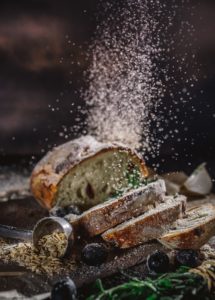
Photo by Helena Yankovska on Unsplash
At the end of the day, I have two enormous round loaves of bread to cool, slice, and put in the freezer. This batch will last me for a year. I have finished another pallet. I leave it on the sawhorses to dry overnight. My stained hands smell like garlic.
I haven’t cried since the last night call, my brother telling me Mom was gone. Perhaps I cried all my tears before she went. I receive condolences with all the grace I can muster. People talk to me about God and heaven. They talk to me about Mom. They talk to me about their own experiences of death. I try to be gracious. I try to look like I’m listening, like I’m there. With my brother and sons, my partner, I can be real. The faces of my friends comfort me. They don’t need anything from me. They don’t ask for anything. I can see their concern, their love for me, their sorrow. They hug me, and smile. They talk to me about small things, the daily things I’ve lost track of – family, friends, outings, work. I pick up a friend’s daughter and feel almost normal, doing an ordinary thing, a manageable task I cannot fail.
I realize part of my feeling of unreality is rooted in a loss of identity. I catch sight of myself in the bathroom mirror and pause. I rarely look at myself in the mirror. This woman, who is she? She isn’t the disappointing daughter any more. She can’t be, if there’s no mother to disappoint. What else is she? Who else is she? I look into my own eyes and feel no shame, no guilt. Did Mom take them with her? How will I navigate my life without them on my shoulders, without the knowledge that Mom is alone, suffering, needing? For fifty years I was at her side, day and night, year after year, ineffectual, helpless to fix or heal her physical pain, her dysfunction. Feeling my failure, my powerlessness, knowing I more often made it worse than better as time went on, even though she clung closer and closer to me as she aged. She could not release me and I almost waited too long to release myself.
But the geographical distance I put between us brought no real release. She still suffered. She declined, grew confused. Her body aged and began to run down. She was just as lonely without me as she was with me, just as emotionally remote, just as relentlessly needy. She cut herself off from me, but I still carried her. Internally, I still orbited around her. I still agonized for her.
I still loved her. I always loved her. I accepted she could not find me lovable, but it made no difference. She was my mother, and I loved her. All I ever wanted was for her to be well, and happy, but I could not make it so, and in her eyes it was my responsibility to fill her need. Indeed, she told me long ago her physical pain started with her pregnancy with me. I accepted the blame, and was heartbroken, and have tried desperately to make up for it ever since.

Photo by Nicole Mason on Unsplash
Now Death has come to stop her suffering. Has mine stopped, too? I don’t know. I’m too numb to tell. But I feel different. I feel … released. I prayed for her release and freedom, not mine, but perhaps they were linked. Many times a day I think of her, hear her voice in my head, and I realize with a painful clench of my heart she’s gone. It’s over. I can’t humiliate her anymore because of what I wear, how my hair looks, what I do, who I sleep with, or, most of all, what I write. She’s moved beyond humiliation. I can’t fail her anymore. And that’s a soaring, joyful, unbelievable thought. I can’t fail her anymore.
I wonder if I’ll finally feel good enough, if I’ll do a good enough job, live a good enough life. Might I simply enjoy my small talents, my joyful work, my community, my garden? Might I immerse myself in the loveliness of life without the gnawing guilt of knowing I’m happy when she’s not, I’m companioned when she’s not, I’m relaxed and rested and peaceful when she’s not, I’m laughing when she’s not?
The last couple of times I spoke to Mom, I told her it was okay to rest now, she could let go, be at peace. We told her her loved ones and animals were well and happy, and she could relax.
I told her, and I meant it. Was I telling myself, too?
She could not release me, yet I am released. Did Death break the chains when he gathered her in? Or now, at last, have I released myself, now that she’s moved entirely out of my power and knowledge?
As I write this, it’s Wednesday afternoon. I have finished another pallet. I have written. I have sat in the sun, read a paragraph or two at a time of an old Edna Ferber novel, rested my eyes on the garden. The lily stems are turning dry and brown, as are the leaves. Sunflowers bloom. The sun is hot. The phone has been sitting on my kitchen table all morning, silent, as I go in and out. I have balanced my checking account, scheduled a private swim lesson in a home pool, ironed a tablecloth and three napkins. Tomorrow I go back to work.
A new page of my life has turned. I can’t read it yet. It’s enough to sit with it in my lap, letting my gaze wander over blue sky and afternoon clouds, the garden, our old cars, the worn wooden boards of the porch, the bruise on my left knee, the mosquito bites on my right arm, the smears of stain on my hands. It’s too bright in the sun to read this new page, too hot, too much effort. I’ll read it later.
I dare to be at peace.
Daughter’s Dream (July 2014)
I dreamt I carried my mother.
The car had slipped out of her control
with a blind will of its own,
and I thought
I knew she shouldn’t be driving.
We landed in water.
I swam to her and held her in my arms.
Then the water was gone.
I carried my mother,
but she left my embrace,
slipping free of her embattled flesh.
Irrevocably, I felt her go.
I was alone.
I carried the vacant body of my mother.
Empty beds stood all around me
but the sheets were disordered and dank,
Smeared with shit.
I carried the vacant body of my mother.
There was no clean place to lay her down.
I carried the vacant body of my mother,
seeking to slip into my own freedom,
seeking absolution.
To read my fiction, serially published free every week, go here: 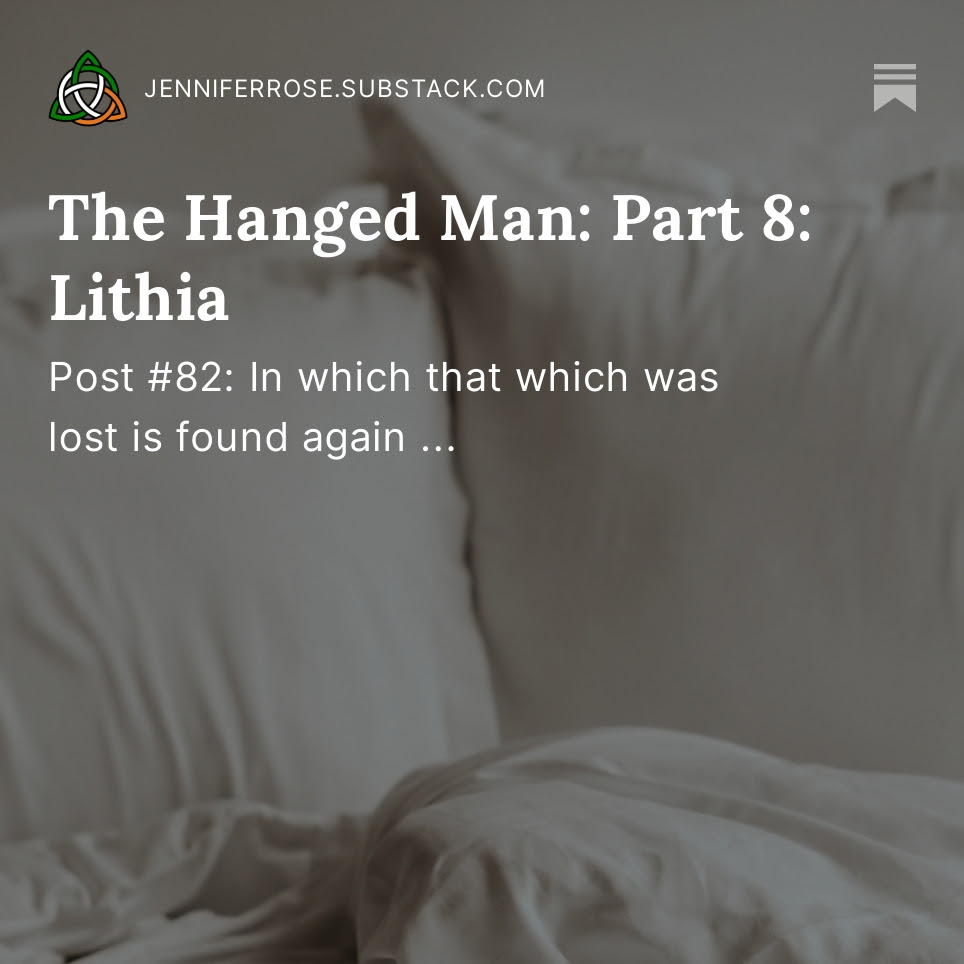
by Jenny Rose | May 13, 2023 | Authenticity, Emotional Intelligence
I have written about dance here before. In the structure I use, the 5 Rhythms Wave by Gabrielle Roth, chaos is part of the wave. The music for chaos is fast but grounded. Think Pink Floyd’s Meddle.
As I lingered on the threshold between waking and sleep this morning, thinking about loss, the subject of my last post; thinking about my distressing inability to publish my usual essay on Substack last week, and thinking about the ways in which I’m reshaping my beliefs about my family and therefore myself, I recognized the chaos part of the dance.

Photo by Leon Liu on Unsplash
To dance in chaos involves letting everything go except the beat. Chaos is about strength, not beauty. It’s about grounding and staying grounded even as the music flings us through space.
Chaos is the part where you dance till you drool.
The edge of chaos is fertile, regenerative, thick with possibility. It’s also powerfully disorganized and unpredictable. It’s exhausting, overwhelming. Too much is happening too fast. When dancing chaos, we give ourselves entirely to the music and follow it through the tumult however we can. As Margaret Shepherd said, “Sometimes your only available transportation is a leap of faith.” Add music to that idea and you have the chaos part of the dance. The car has broken down. The planes are grounded. The train has derailed. The illusion we’re in control has shattered. Our routines and schedules fall apart around us. Our internal and external worlds begin to reshape in ways we can’t understand.
I’ve been troubled in the last couple of weeks by the violence of my rebellion against doing anything except work and play in the garden. I don’t want to write. I don’t want to think or reason. I don’t care about the damn housework. Beltane, May 1st, came and went without my usual ritual and practices. I don’t want to be brave, strong, organized, compassionate, tolerant, empathetic, or responsible.
I can’t remember a time in my life when I’ve shut down like this. I’m unable to guilt or lash myself into being “productive.” I feel ashamed and scared. I don’t recognize myself.
It occurs to me this is my Beltane ritual this year. After all, Beltane is about fertility. Physical fertility, the cyclical fertility of the growing season, creative fertility. My ritual this year is being in the garden. There, with my knees in the dirt, the smell and feel of the soil, the texture of new weeds and old leaves and matted grass (we didn’t have a mower last year), I am peaceful. I know where I am. I am, literally, grounded. I don’t have my phone. Nobody needs anything from me. I bend, kneel, stoop, dig, rake and shovel compost mindlessly. I dream vaguely about new garden beds, rewilding with native shrubs and trees. Black flies come for their drop of blood. The sun shines down on me.
Right now I need to be in the garden. I don’t understand it entirely, but perhaps there’s no need to. What I do know is something in me refuses to engage with anything else. As the lilies and iris emerge, as the tulips bloom and the daffodils fade, as the lilacs bud and the magnolia blossoms fall and cover the ground, I mulch and prune and feel seismic forces beyond my control reshape me internally.

Photo by Kelly Sikkema on Unsplash
So much of what I’ve learned and believed about my family and my place in it has crumbled into dust. Old family myths have exploded with fragments of evidence from Mom’s life, unearthed in the process of selling her estate. I didn’t entirely believe in some of those myths, but they were stable. They provided a family background I was familiar with. I built an identity from the identities family members who came before me created. If I am not the despised one, the broken one, the one who doesn’t belong, the cuckoo in the nest, who am I? Has all that been yet another family myth? Has any of it ever been about who I really am or my personal value, or have I been nothing but a faceless, nameless piece in a dysfunctional family pattern?
I long for freedom. Is this the beginning of freedom?
My recent inability to force myself to take care of business, to be responsible, consistent, and productive, is terrifying. I’ve always pushed myself through any resistance or fatigue. I’ve always known I must justify my existence with constant production, pleasing, and caregiving.
Am I free of that now? If I don’t have to justify my existence because that belief is a lie based on family mythology that’s at least part lies, is that freedom? Am I brave enough to take my freedom, walk away from all the burdens (too heavy for me, but I’ve carried them anyway), and simply choose what makes me happy? I have stood at this crossroad before.
Two weeks ago I wrote about loss. Now I’m watching glimmers of new beginnings, nebulous glints of what might come into the disturbed ground of my being. I pick up trash and find rich soil beneath it. I dig up dandelions and burdocks and discover little patches of old garden. The sun touches me without asking for anything in return. I rake away last year’s debris and mix it with compost to build new garden beds. This morning, the crab apple is in bloom. The tight buds on the white lilac by the porch door gather perfume.
Meanwhile, back in Colorado, strangers live in my mother’s house. Hospice tells me Mom can no longer ambulate independently, even with her walker. A call in the middle of last night reported yet another fall, as she doesn’t realize (or won’t admit) her own weakness. Appraisal revealed my wealthy and powerful grandmother’s gold, pearls, and gemstones were mostly costume, not real. A ladylike façade. A denial of her impoverished roots. A glimpse of shame and fear that rival my own, though I never knew they were there.
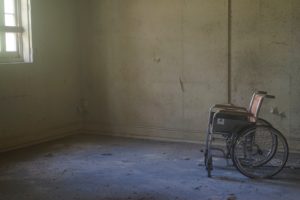
Photo by Doug Maloney on Unsplash
It’s Mother’s Day weekend. A friend asked me yesterday how I felt about that, and I had no words.
What is real? What can I bear? The dirt on my knees, under my fingernails. The spectacularly itchy, burning welts of black fly bites. The egg shells, banana peels, and soggy segments of lemon in the compost pile. The lovely cupped double tulips I planted last fall, white, pink and purple. The thumb-sized bumble bee tumbling ecstatically among the pink blossoms of the crabapple. My own breath, heartbeat, sweat. The sun on my skin.
Gardens are made and remade. They die and are reborn. They go wild and survive until rediscovered. They adjust, adapt, take advantage of the edge of chaos according to their own wisdom and purpose.
For now, I’m in the garden, dancing with chaos, nurturing new life, hanging on.
Questions:
- What is your experience of Mother’s Day?
- In the times during which you struggle to manage your life, are you fearful or do you allow yourself to follow your needs?
- Do you find chaos joyful and exhilarating or frightening?
- What opportunities have you had to reframe your family?
Leave a comment below!
To read my fiction, serially published free every week, go here: 
by Jenny Rose | Apr 29, 2023 | A Flourishing Woman, The Journey
I have returned from ten days in Colorado during which my brother and I prepared for and hosted a living estate sale. Together, we emptied, polished and cleaned my mother’s house. Thankfully, she herself was oblivious, as she is in memory care with a hospice team supporting her.

Photo by Michal Balog on Unsplash
We were successful in our goals, which were to spend time with Mom, hold the sale, and ready the house for renters, who are moving in as I write this.
It doesn’t feel like success, though. Since I arrived back home to Maine, I’ve been groping for what it does feel like, but I couldn’t come up with a clear answer until this morning.
It feels like loss. It feels like a hundred small losses.
Until I came to Maine, Mom and I lived in a small town at the foot of the Spanish Peaks in Southern Colorado. The town lies in a green (sometimes) valley nestled below the Trinchera Mountain Range and the peaks, and something about its geography brings harsh, dry winds that scour the landscape for days, filling the dry air with bits of desiccated landscape. The wind is relentless, without mercy, inescapable.
It was windy for the first several days we were there, and I feel as though I have been staked in the teeth of that wind, like a plastic bag caught on a barbed wire fence, whipped and shredded into ribbons.
I hadn’t realized before that cleaning out an old person’s house is never about just that person. Mom, as the oldest remaining family member, kept papers and pictures regarding known and unknown ancestors, fragments of hidden family stories. She had her mother’s antique armoire, filled with crystal stemware, silver, and china with gold accents. Cupboards and drawers housed ornaments, cut-glass dishes, and jewelry that belonged to my maternal grandmother. Cross stitch, embroidery, and needlepoint done by that same grandmother and my younger self hung on walls throughout the house. She held onto papers and records from my adopted father, deceased for many years. Mom still had his good parka and a pair of his almost unworn boots in her coat closet.
We recycled and shredded pounds of paper, filled and tied countless bags of trash. I packed boxes and baskets and plastic storage containers with bathroom products, cleaning products, dishes, silver, kitchen stuff. I put inexpensive jewelry on a tarnished silver tray for the sale. We used up all the old newspaper for wrapping and I put out an SOS for more, which speedily arrived. I packed boxes to ship home to myself of the few mementos I wanted and took them to the post office, one by one.
All these bits and pieces of lives, of family. A collection of nail clippers and tweezers, from rusty and stiff to new. Hundreds of greeting cards for every occasion. Old letters, report cards, school papers. Boxes and albums full of photos.
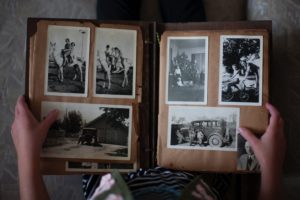
Photo by Laura Fuhrman on Unsplash
In the laundry room, I sorted through products for cleaning, polishing, waxing, staining. I found three open bottles of lemon oil for wood, sticky and congealed. I discarded old sponges, rags, scrub brushes and a broken Swiffer.
I moved Mom into that house. I painted the front and garage doors. I painted the trim around the new windows. I painted the walls in the sun room and hallway.
I felt engulfed by the past, a past I prefer not to dwell on, a past I would like to let rest in peace.
But the wind caught me, pinned me against the thorns and spines of the high desert, and had its way with me.
Is home the place that glues us together? Perhaps. Perhaps that’s why I feel unglued, fragmented, as though I have left pieces of myself in my wake for the last couple of weeks. I inadvertently left a book I was reading on a bench while waiting to meet my brother at Denver International Airport the night I arrived. It was a good book, too. Part of me still sits on that uncomfortable bench, reading, watching reunions, waiting out the slow minutes until the tall form of my brother rises into view on the escalator.
We found pieces of ourselves in that house, my brother and I. I wondered if I looked as lined and shadowed as he did. I wondered if I looked as frayed and torn as I felt. My mother’s fleshless face, fragile skin, and bewildered eyes clawed at my heart.
Part of me is on each of the two planes that carried me across the country, wedged in among strangers, my bag between my feet, my backpack between my knees, while I read and dozed and tried not to think about how uncomfortable I was, tucking my elbows in tightly so as not to intrude upon my neighbors.
Part of me sits at various disheveled, grubby, airport café tables, anonymous, utilitarian, with the hard-used look of all airport eating establishments where the high-priced food tastes of weary miles.
I cried in the shower at Mom’s house, letting the water wash my tears, my hair, my skin cells down the drain and into the wastewater system of my old town.
I found pieces of myself in the faces of my friends, in an outdoor hot tub at dawn with a dear one, in a dance with some of my old dance group, all the more poignant because of the absence of others. I filled my eyes with the majestic Spanish Peaks, looming over the valley. They anchored my life for years.
I found pieces of myself, too, on the dusty interstate highway I traveled hundreds of times during my years in that place. The pronghorn antelope, the giant wind turbines, the miles of yucca, cholla cactus and tumbleweed. The familiar place names and exits. Surely some part of me will eternally drive north and then south along those miles, some ghost, some echo.
Part of me is still standing in the 6:00 a.m. hour-long line for TSA at Denver International, shuffling forward a few feet at a time, surrounded by hundreds of other people, early-morning faces creased, crumpled, yawning, and resigned. Mothers with children. Families. Couples. Young people. Old people. Businesspeople.

By David Edkins on Unsplash
I deliberately left a book on the bus that brought me from Boston Logan Airport to Augusta, Maine. I was finished with it and I didn’t want to carry it any more. Perhaps it will be a happy find for some other traveler who will sit where I did, taking their own journey, and their hands will turn the pages I touched, their eyes travel down the printed lines.
I said hello, and then I said good-bye again, not knowing if it was a final good-bye. Hello and good-bye to the memory of the good man who was my adopted father. Hello and good-bye to my mother’s parents and their parents and theirs. Hello and good-bye to my brother. Hello and good-bye to my oldest son, now living in Denver. Hello and good-bye to my friends, to Mom’s friends, to the dusty dirt roads, to the two houses I lived in during my years in that town, to my memories, to the community, the places I shopped, the places I ate, the places I danced and worked and told stories and hiked.
Hello and good-bye to Mom and the caregivers I met and conferenced with.
So many good-byes. Too many good-byes.
And then hello. Hello to my partner. Hello to the initially disbelieving cats, who still zoom around in excitement and welcome days later. Hello to my comfortable bed, my serene room, my kitchen, my giant-sized tea mug, my laptop, my little bathroom, my electric toothbrush.
Yesterday I went out to sit on the porch and read. It was beautiful in the sun; the garden full of exuberant new life. I put my book down and weeded, discovered bulbs coming up, and planted peony roots. Those hours were the first feeling of coming home to myself.
I’ve come home to the simple rhythm of swimming, to the warm, humid, familiar routine of my job in a rehab pool facility. I’ve come home to the keyboard and the page.
I went to the store this morning. I had a list. I drifted up and down the aisles, putting a few things in the cart. I set a book I was finished with on the donation table. It was as though I walked through the little mom-and-pop store in my old place in Colorado and the Safeway in a nearby larger town at the same time. I felt confused. I walked in a dream. I forgot where things were. I couldn’t focus. I left with a small bag of groceries I didn’t feel like I really needed or could use. I came home, made a cup of chai, and used up the milk. I knew I needed more and remembered while I was shopping, but I didn’t buy any …
Too soon to shop. Too soon. I’m not all here yet. The pieces I left behind are still caught in the wind of my passing. I feel as threadbare as Mom’s memory. I wonder if all those pieces will find me again or if the wind has carried them away forever. Do I want all the pieces? Did they slough away because I no longer need them? I can’t tell. I don’t know.
Two things are clear to me. The first is something I read and wrote about somewhere on this blog. The greatest thing we can do to honor those who came before us is to live our lives fully. Grieving fully does not mean living in grief forever. Living fully means living now, not in the past. Living now cannot be accomplished with clutching hands and a clenched heart. Now is not then, nor is it a future that never arrives. Now is now: the sleeping cats, the creamy pink flowers on the magnolia outside the window, the sound of the birds at the feeders, sunlight on the neighbor’s house.
The second is that none of us can live in two places. I transplanted myself to Maine years ago, and have no regrets. My roots are watered here. I belong here. It’s my place now. We need each other. For this day, I will choose to believe all the pieces of myself I need will find me again, will gradually come home to me. The rest I will simply let go, as I’ve let so many things go during the last days and years.
Questions:
- Have you ever been responsible for sorting through a loved one’s possessions and wrapping up their life? What was the hardest part for you?
- What’s the best support you’ve received during a process like this?
- How have you supported others who have needed to manage a loved one’s estate?
- Have you ever felt so emotionally exhausted you couldn’t function? What helped?
Leave a comment below!
To read my fiction, serially published free every week, go here: 
by Jenny Rose | Jan 28, 2023 | Emotional Intelligence, Feelings
As I write this, I have just returned from a long journey across the country and into my past. I’m home again, but the journey is not over and I expect to retrace my steps back and forth for some undetermined length of time.
The physical journey, however long, is nothing to the internal journey I’ve undertaken through my memories, family dynamics and history, and so much of what has shaped my life and experience.
Before I left, I came across this poem by David Whyte:
Here in the Mountains
There is one memory deep inside you.
In the dark country of your life
it is a small fire burning forever.
Even after all these years
of neglect
the embers of what you have
known rest contented
in their own warmth.
Here in the mountains,
tell me all the things
you have not loved.
Their shadows will tell you
they have not gone,
they became this night
from which you drew away in fear.
Though at the trail’s end,
your heart stammers
with grief and regret,
in this
final night
you will lean down at last
and breathe again on the
small campfire of your
only becoming.
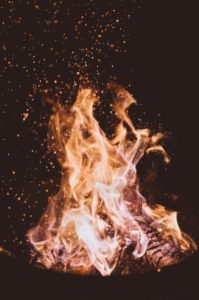
Photo by Joshua Newton on Unsplash
“Tell me all the things you have not loved.” This is an invitation I’ve never heard before. My focus has been on gratitude, on reframing, and on finding something good in every situation. I call myself a pessimist rather than an optimist, though I do leave windows and doors open for good things to happen while preparing for the worst.
My friends and I talk at work about the way we avoid “complaining.” A male coworker was taught as a child to refuse to give way to pain and illness, to work through it silently and privately without “complaint.” Is complaint the same as acknowledgment? I’m not sure. Three of us, all women, are more comfortable acknowledging our struggles and distress than our male friend, but none of us want to hear ourselves “whining.” Is whining the same as acknowledgment? I’m not sure about that one, either.
Because of my own confusion and blurriness around the terms we use and the cultural pressure towards toxic positivity, speaking about the things we have not loved is a jarring proposal. I carried it as I traveled on cars and buses, airport shuttles and airplanes. I hardly wrote at all over the last week. One journal entry by hand on the plane and the rest of my notebook filled with to-do lists, notes, names and numbers.
But I thought about things I have not loved.
It’s not just the invitation, though. It’s the way Whyte suggests all the things we have not loved are the background against which our lives are pinned, the shadows defining the light. I think of the night sky, gleaming with stars. What would the stars be without the blackness around them? I think of candle flames, fireflies, a lone campfire in the wilderness in the black night.

Photo by Jeremy Thomas on Unsplash
And isn’t it true that the things we have not loved don’t go away? Don’t they stay with us more inexorably, in fact, than the things we have loved? It seems so to me. Thus the fear, the drawing away, the heart filled with grief and regret. But at the core of our lives perhaps there is a small fire, patiently burning, waiting for us to come to our trail’s end. I think some would call the small fire God.
I realize one of the largest things I have not loved is love. A strange thing to realize, and a strange thing to say, I know. But so often my love has been helpless. The strong bonds, history, and feeling (all of which I mean by “love”) I feel for my parents, my brother, and my sons have been the greatest sources of pain in my life. Five vast, dark, wildernesses surrounding five campfires, these five who are flesh of my flesh, blood of my blood. These five who I could never stop loving, even if I wanted to. No matter how great the shadows around the fires, the flames burn, warm, beautiful, cleansing, regenerative. Often, I wish I could stand just outside the firelight, unseen, and simply love without fear, without pain, without wishing to be loved in return. But I do draw away in fear from the heat, the flame, the passion of the fire. I cherish the fires and would protect them with my life, but I fear them, too.
I have not loved the trauma and abuse that has shadowed what I love. I have not loved my disillusionment or the terrible choices I’ve made in building boundaries and learning to love myself. I have not loved my feelings of loss, insecurity, scarcity, and exile. I have not loved my pain and grief. I have not loved learning to let go.
I did not love walking into my mother’s home, the place where she has lived her self-imposed solitary journey into dementia and inability to care for herself. I did not want to follow her trail into the darkness of fear and denial, marked with soiled clothing and bedding, desperate and increasingly nonsensical and illegible notes and reminders. I did not want to go through drawers and cupboards of vitamins and supplements; over-the-counter remedies for pain, sleep, memory loss, skin problems and digestion issues. I did not want to fill trash bags with worn-out but never discarded clothing and shoes, a thousand used emery boards, outdated products and food.
I did not love going through every stitch of her clothing, sorting, washing, labeling with a laundry marker and packing it all to take to her new home in a memory care unit. The day after I carefully loaded her dresser, newly cleaned and placed in her room, we visited and found she had dumped every drawer into her laundry basket. She was “packing” to go home.
I did not love doing any of it. I did not want to do it. It broke my heart and filled me with futile guilt and shame. But at the center of every bag of trash, every bag and box to be donated, every clean drawer and cupboard, burned the small fire of my love for my mother. Inescapable. Inexorable. In a strange way, all the things I did not love were fuel to keep that fire burning. The more shadows I found under beds, in closet corners, in drawers and cupboards she forgot she had, the brighter the fire burned. My pain and pity, my anger with her lifelong pattern of denial and rejection of any help or support, made the fire burn higher. To tend the fire is to face the darkness.
And I would not have the fire go out, though I feel torn into pieces by its presence.
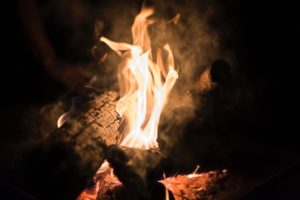
Photo by Josh Howard on Unsplash
It’s been a dark week, a week of deliberately moving into the things I have not loved. Drawing back was not an option. I could only step into the void. But the darkness has held a thousand small flames. The faces of old friends, both mine and Mom’s. Her animals, once so beloved but now forgotten by her, rehomed and doing well. A hundred acts of kindness and generosity. Help with moving furnishings into her new room. A cherry pie. Hugs and tears. The good-hearted friendliness of dogs. Constant support. Texts, emails, phone calls – all messages of succor and sympathy for me and my brother, for Mom. The friend who cares for the plants. The friends who keep an eye on the house. The friend who took a load to Goodwill for me. The friend who will take out the mountain of trash in the garage. And, when I came home, the arms of the friends who welcomed me back.
The shadows and the light. The things I have not loved cradle the things I do love. I am so weary I cannot begin to unravel the paradox. Perhaps it cannot be unraveled, only accepted and experienced. Perhaps Mom is wandering in her own dark wilderness, seeking the small campfire of her becoming, and when she finds it, leans down to breathe upon it, she will at last know peace.
Questions:
- Share three things you have not loved.
- Do things you have not loved persist in your life? What creates a background for what you do love?
- What is the difference between complaining (whining) and acknowledgment? Do you believe it’s wrong for you to admit to personal struggles?
To read my fiction, serially published free every week, go here: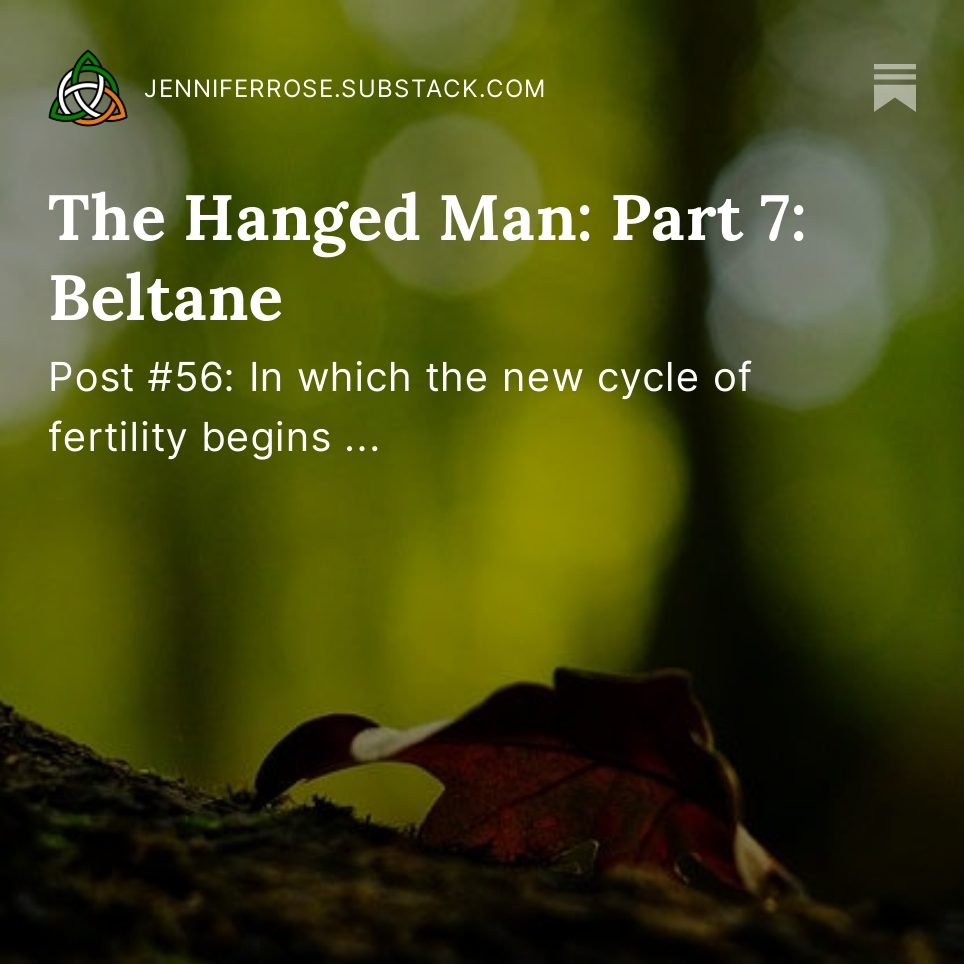
by Jenny Rose | Dec 17, 2022 | A Flourishing Woman, The Journey
I’m pausing. It wasn’t, I hasten to say, my idea! However, after an interesting and stressful concatenation of events I’ve decided to embrace the opportunity to pause.
It all started with a wonderful post from one of my favorite Substackers, Lani Diane Rich. It’s titled “Emotional Ex-Lax.” Honestly, how could anyone not go look at that post?

Photo by freddie marriage on Unsplash
The post suggests an exercise in blind journaling. I journal daily, first thing in the morning, with my first cup of tea. I don’t go on line first. I don’t work in the house, or start breakfast, or make my bed, or clean the cat boxes. I feed the cats (because if I don’t I won’t be allowed to sit peacefully and journal). I pee. I turn on one low light. I heat water and make tea. Sometimes I put on very low music. Sometimes I light a candle or two. At 5:00 in the morning there’s nothing going on. Darkness presses against the windows. Nobody needs anything from me. I’m free, and something of sleep’s twilight lingers. I sit with my laptop, open a new document, and start typing. Every month I delete the last month’s journal entries. I never look back at them. They’re for no one else’s eyes. It’s an entirely private space.
If, for some reason, I miss this time with myself, I notice it immediately. I’m not as centered. I feel more anxious. I feel more stressed. If I can’t get to a word processor, I journal with pen and paper, and then destroy it.
I never thought of blind journaling, though.
I recognized resistance. As I peeled the resistance away, I discovered the roots of it: perfectionism. That made me mad. I’ve worked so hard to uproot that toxic growth, but I never seem to get it all eradicated. It’s like bindweed, that bane of gardeners. Out in Colorado, where I used to live and garden, bindweed choked the dry landscape. Its roots can grow 6 feet deep. Any attempt to dig it up or kill it above ground merely encourages it. It grows fast. Herbicides don’t work. Its folk name is ‘Devil’s guts.’ A perfect description.
I think about perfectionism as bindweed.
Even as I journal, I edit. I correct spelling. I make sentences and paragraphs. Sometimes I even cut and paste. For a journal no one else will ever see and I won’t read again. For a journal document I’m going to delete in four weeks. If I blind journal I can’t edit as I write.
It won’t, God help me, be perfect. It won’t even kind of be perfect. I’m a good typist, but I make mistakes. Sometimes the cursor jumps around. Sometimes my sentence structure is poor.
Unacceptable.
So, naturally I made up my mind to try blind journaling, to challenge my perfectionism if for no other reason.
I chose a day off and journaled the usual way for a bit, then set a timer for 20 minutes, shut my eyes and blind journaled. I thought I was already emptied out, but wow. I was in full flood when the timer went off, and it felt like I’d only been doing it for five minutes. I loved it. I knew I was making mistakes (which I refused, by the way, to go back and fix!), but they didn’t interrupt my process. I just kept going, never looking back, never losing the thread of what I was saying. No visual distraction whatsoever.
I didn’t want to stop.
Well!, I thought. This will be a fun thing to blog about.
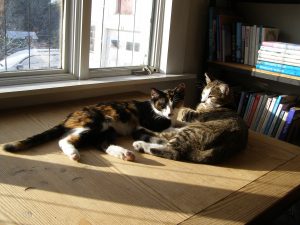
Izzy & Ozzy; Fall, 2020
I picked up my 16-ounce cup of tea, pomegranate green this season. Our little calico cat, Izzy, who had been snuggled in her favorite position in my armpit, woke up and decided she wanted to be in my lap where the laptop was. I pushed her away. She came back. I pushed her away. She started chewing on the upper corner of the screen, an obnoxious habit she has. I pushed her away with more irritation this time. The tea I was holding slopped onto the keyboard. I cursed, wiped it away, tipped the computer and let it drip out. I got a couple of Q-tips and dried around the three or four keys that got splashed. I sat down again to go back to my peaceful morning journaling.
The computer died.
Shit!
I plugged it in in case the battery was run down, but I knew it wasn’t. I let it be for an hour, then tried to turn it on.
Nothing.
When the computer store opened, I got in the car and took it over. Mark, my computer guy, shook his head. I left it in his capable hands.
Now my quiet day off, in which I didn’t have to go anywhere or do anything but noodle around at home, had turned upside down. My serenity fled. My excitement about starting a rough draft of a post on blind journaling withered. I couldn’t pay bills and deal with money, always a major stressor. Speaking of money, replacing my laptop would cost over $1,000. And what would repairs cost? And how much money do I have in savings? In checking? I couldn’t check! Panic until I remembered my cell phone is connected to the Internet. I couldn’t write, at least not with a word processor.
But none of that was the worst thing. The worst thing, and I’m completely mortified by this fact and would prefer to hide it from both myself and the world, was I couldn’t play solitaire!
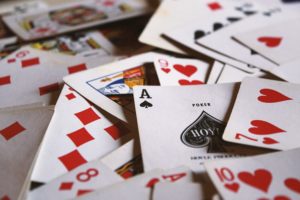
Photo by Jack Hamilton on Unsplash
This realization was so unwelcome I longed, craved, itched to play a few games of solitaire and “think about it.” Except that’s a lie. I wanted to play solitaire so I could numb out.
I roamed around the house, restless, wanting to crawl out of my own skin. The day I had looked forward to suddenly seemed dull and endless. I didn’t want to read. I didn’t know what to do with my anxiety. I started waiting for the phone to ring with news of my machine.
I did eventually get a grip but I recognized the symptoms of withdrawal from an addiction, and I didn’t like it. I kept myself busy with several tasks I’d been putting off. I cut greens I’d gathered with a friend a few days before and decorated for Yule. I pulled out a notebook and continued journaling, off and on, long hand. It gave me a sore hand, but it helped. I told myself I could rough out a blog post long hand, too. But it was probably not worth it. I’d have my laptop back by the end of the day. Probably. Maybe. Wouldn’t I?
I set aside the budget and a couple of bills I’d just received and weren’t due for a week or more. I tried not to think about money, or scarcity, or money.
Not thinking about money – la, la, la-la – fingers in my ears and eyes squinched shut.
I tried not to think about my email piling up. I read some of it on my phone, but the screen was so small it wasn’t much fun.
I thought and journaled about how busy I always feel, how often I hear myself say I’m tired, how overwhelmed I feel. I’ve been telling myself feeling overwhelmed is natural. I work; I run a blog and a Substack page, publishing on both every weekend; I’m writing another book; and now I’m co-manager of a long-distance situation in which a loved one is recovering from a broken hip and sinking into dementia. I anticipate making the long trip from Maine to Colorado and back again at some point during the holiday season, running the gauntlet of weather, travel complications, crowds, and various respiratory viruses. Oh, and spending money I don’t have. Especially if I have to replace my laptop.
Of course I’m overwhelmed.
Yes, said a snarky little voice in my head, “and how much time and energy does it cost you to play solitaire in all the pauses, cracks, and crevices of your life? What about visual stimulation? What about your problem with speeding? What about your anxiety? You’re not helping your anxiety, you’re feeding it!
The day passed and the computer guy didn’t call. The next day was a work day. Normally I would have been working on posts for the weekend ahead. I was beginning to feel behind. If I didn’t get the laptop back I wasn’t going to be able to post. Less than perfect. Inconsistent. Letting my readers down. Everyone would probably unsubscribe. Even if I got the laptop back, the weekend was going to be tight. Starting from scratch on Saturday morning for Harvesting Stones and on Sunday morning for Substack takes a lot of hours out of my weekend, when I also run errands, clean, do laundry, cook for the week ahead, and take care of business I haven’t had a chance to do during the week.
And I was already tired. Already wanting those two days off, not to fill up, but to relax in. Could the solitaire really be feeding my anxiety rather than calming it, I wondered?
Yes.
But –
Yes, your solitaire habit is feeding your anxiety. You know it.
Shit!
At the end of the day, I called my computer guy. He informed me my machine was disassembled and he’d been running a fan on it night and day. He didn’t know if it was a goner or not; he wasn’t going to put it back together and plug it in until he was sure every molecule of water was gone. He told me, rather pointedly, he’d call me.
OK, I thought. I won’t post this weekend. Nobody will care but me. I’m allowed to take a weekend off. I read all kinds of people who take frequent breaks and pauses. I don’t think any the less of them for it; in fact, I admire their self-care and confidence.

Photo by Alex Iby on Unsplash
Friday happens to be my nine-hour day at work, so I wouldn’t have used the laptop much that day in any case. I gritted my teeth, used a computer at work to catch up a little, and tried not to worry too much. I never play solitaire at work, so it was my third day without it.
Meanwhile, I made and received long distance calls from the facility where my loved one is recovering physically and wandering mentally. I finished the book I was reading and started another. I journaled a lot in my notebook. I played with the cats, giving them my full attention, which felt nice. I noticed what I was eating and enjoyed the taste of my meals, unusual for me. I savored my tea more. I wrapped a few Yule gifts and got them in the mail. I did some cleaning. I exercised. I put on an old movie and did upper and lower body resistance training in front of it rather than playing solitaire.
I slept well. I felt less exhausted. The inside of my head was quieter. I even took a nap, a thing I don’t normally do, as playing solitaire is “resting.” (Uh-huh. Whatever you say.) My anxiety ratcheted way down. I had a couple of crying jags, but they passed and I felt relieved rather than more upset when they were over.
I had more time.
I have more time because I’m not writing without my laptop, I thought.
“No. You have more time because you’re not playing solitaire in all the cracks and crevices,” said the snarky voice.
On Friday, while I was at work, my laptop was resurrected and my partner brought it home. What saved its life, I am told, was there was no sugar in the tea. Who knew?
By Friday evening, when I returned home from work, I’d made some decisions:
- No more solitaire.
- No more liquid in close proximity to the laptop.
- Take the weekend off. Really take it off. No pressure to post and publish. No solitaire. Embrace the pause. Make it last. Feel about things. Think about things. Be present.
All weekend I had the half delighted, half guilty feeling I was playing hooky. I ran several errands. I journaled on the word processor. I dealt with receipts, bills, accounts, the budget. I did some cleaning and laundry. I read. I listened to music. I watched a couple of movies and exercised. I played with the cats. I texted with a friend. I talked to my loved one and their nurse in Colorado. I made a new recipe for a pork shoulder in the crock pot which made the house smell like citrus, garlic, and herbs. I read several inspiring pieces from the Substackers and minimalists I follow. I started making notes for this post, which flowed into writing a rough draft.
It was a good weekend. It didn’t feel too short or too rushed. I didn’t feel pressure or anxiety. I slept well.
I’ve realized it’s time to make some changes. It’s a good time of year to reevaluate and do that, right? I didn’t set out to do it, but once it was forced upon me I realized I’ve been running a little faster every day for a long time, feeling a little more tense and anxious, and needing a little more numbing to manage it all. I’m grateful I was forced to stop. I’m going to start moving again, but in a different way, with slightly new priorities and without the damn solitaire!
(“You’ve finished the post!” says the snarky voice. “You’re way ahead this week. Wouldn’t you like to relax, play a game of solitaire, and celebrate?”
Oh, shut up!)
Questions:
What’s your favorite numbing activity?
On a scale of 1 (hardly any) to 10 (all), how much of your power does it have? Are you uncomfortable about the level of power your habit has over you?
Does your habit increase your anxiety?
Does your habit decrease your focus?
Have you ever formally kept track of the time you spend doing your favorite numbing activity?
Leave a comment below!
To read my fiction, serially published free every week, go here: